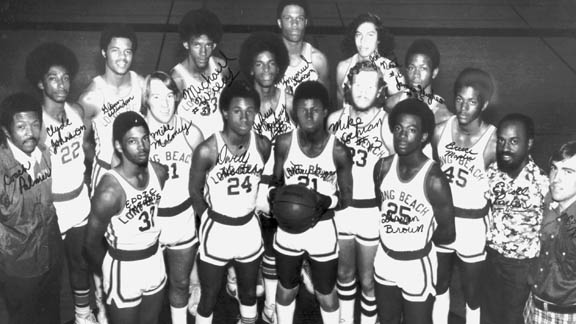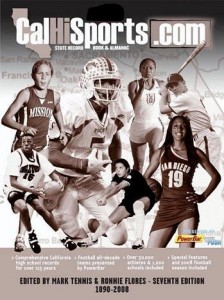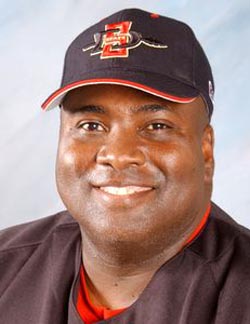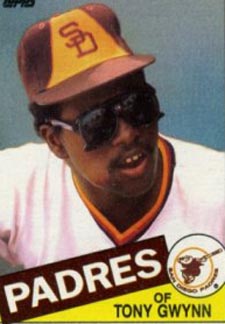
Tony Gwynn is holding the ball in this photo of him with the Long Beach Poly 1975-76 basketball team, which is the State Team of the Year for that season and ended No. 3 in the National Sports News Service final rankings. Photo: Courtesy historian Bruce McIntosh.
The San Diego Padres’ all-time great, who died on Monday, loved basketball so much when he played at Long Beach Poly that he had to be talked into playing baseball in his senior year. We did a cover story with him in 1992 for the Cal-Hi Sports edition of Student Sports and wanted to share an updated version of it as a tribute.
Note: Major League Baseball Hall of Famer Tony Gwynn died at age 54 on Monday at Pomerado Hospital in Poway due to complications of salivary gland cancer. This story originally appeared in 1992 and has been altered to reflect final stats for Gwynn’s career.
Note: The first Cal-Hi Sports e-book, “California: The Baseball Capital of the World” is still available on Amazon, iTunes and other on-line e-book stores such as Kobo and Barnes & Noble. It’s just $3.99 to order. CLICK HERE for the link to the book on Amazon.
To read our breakdowns on each of the 40 baseball teams in our final state rankings and for more rankings/state record book content, you need to be a Gold Club member. It’s a great deal at less than $2 per month. Join our team today by CLICKING HERE.
It’s easy to see why Tony Gwynn thought of himself as more of a basketball player than a baseball player when he attended Poly High in Long Beach.
During his last two years at the famed Atlantic Avenue school, the baseball teams that Gwynn played on had a combined league record of 3-25-2, while the basketball teams went 53-6 and advanced to the CIF Southern Section Class 4A championship game twice.
Gwynn was so happy playing basketball that he strongly considered concentrating just on basketball and skipping baseball prior to his senior year of baseball. Then mom stepped in and offered some advice.
“I’ll never forget my mother (Vendella, who has survived her son) saying that I had better go ahead and play another season of baseball,” Gwynn recalled during a 1992 interview with Cal-Hi Sports. “She said it might be something down the road and that I might be sorry later if I didn’t play.”

The people sorry later were National League pitchers. Gwynn won his first batting title as a San Diego Padre with a .351 average in 1984 and then won three straight batting titles with marks of .370 in 1987, .313 in 1988 and .336 in 1989.
When Gwynn retired in 2002, he had won eight batting titles in all with a career average of .338, the highest of any player who began a career after World War II.
Some of his abilities to put the bat on the ball and not strikeout were just mind-boggling, such as zero strikeouts in 107 career at-bats against Hall of Fame pitcher Greg Maddux or just 15 strikeouts in the entire 1995 season.
It was therefore a no-brainer when Gwynn became a first-ballot Hall of Famer along with legendary shortstop Cal Ripken Jr. of the Baltimore Orioles in 2007.
On the day of his death, calling Gwynn the greatest Padre ever was common. MLB commissioner Bud Selig also called Gwynn “one of the most accomplished hitters that our game as ever known” and added that his “all-around excellence on the field was surpassed by his exuberant personality and genial disposition in life.”
Poly’s State Team of the Year – in basketball
The middle son of three boys, Gwynn grew up in a sports-minded household in a sports-minded community. All three Gwynn brothers dreamed of playing at Poly High, a school that also has produced all-time great athletes such as Billie Jean King, Mack Calvin, Gene Washington, Tony Hill, Martha Watson, Earl McCullouch, Willie McGinest and many others. It’s also the school that has won twice as many CIF state titles combined in all sports than any other school in the state.
Tony was a year younger than older brother Charles, who played baseball at Poly, Compton College and Cal-State Los Angeles before embarking on a teaching career. He was three years older than younger brother, Chris, who matched Tony’s baseball-basketball combination and played for the Los Angeles Dodgers.
The highlight of Gwynn’s high school athletic career was starting at point guard as a junior on the 1975-76 basketball team.

Gwynn had recently signed a one-year extension to continue as the head baseball coach at San Diego State. He often attended the Area Code Games in his hometown of Long Beach to scout future players.
The other starters on that team were seniors Michael Wiley (6-foot-7, All-American), Johnny Nash (6-foot-6, All-American), James Hughes (6-foot-4, All-CIFSS) and guard Clyde Johnson (6-foot-2).
It was a team that was expected to do well, and more than lived up to it. The Jackrabbits finished with a 30-1 record, won the Southern Section 4A title, are listed as the State Team of the Year and were considered the best team on the West Coast. The team’s only loss in a 30-1 season was a 55-53 overtime loss to Compton in Moore League play. Poly won the Glendale Tournament, Beverly Hills Tournament and San Dimas TOC. The only other team in the state to win 30 games that season was Cupertino, led by future Lakers’ forward Kurt Rambis.
Gwynn scored 10 points in the 69-50 win in the final over Buena of Ventura before more than 10,000 fans at the Long Beach Arena.
“I remember that team like it was yesterday,” Gwynn said (again in that 1992 interview). “Not many people are fortunate to be part of something like that. And never, even including my years in the pros, have I seen a team so determined to win the whole thing.”
After the final game, when the pressure was off, Gwynn sat on the floor of the arena and watched with everyone else as the seniors let loose with an impromptu dunk show.
“Those were the days when you couldn’t dunk in a game,” Gwynn said. “As juniors, we just sat on the floor and drank it in. It was their show.”
Gwynn became more of the show himself in his senior year of basketball, but it was more of an up-and-down season for the Jackrabbits as they finished 23-7. He averaged 10.3 points per game as a senior on another balanced team and was a All-CIFSS choice.
Coach Ron Palmer, who returned to the school in 1988 after a brief stint at Long Beach State, had a firm grip on his point guard and took him aside for two stern talks.
“Ron was one coach who taught me a lot about myself,” Gwynn remembered. “He always stayed on top of us. He told me to do what you’re capable of doing and stick with it.”
Gwynn nearly led Poly to a second straight section title. After they finished third in the Moore League, the Jackrabbits defeated Loyola of Los Angeles in their first playoff game, 73-60, with Gwynn scoring a game-high 21 points. They next posted wins over Palos Verdes of PV Estates, Verbum Dei of Los Angeles and Compton before losing to Pasadena in the final 57-50.
Shortly after that game and after receiving the advice of his mother, Gwynn returned to the baseball diamond. Although the Jackrabbits were floundering in the midst of a 3-16-1 season, Gwynn immediately lit a spark by collecting 11 hits in his first 16 at-bats. The team, however, was never successful.
“We could barely find enough guys who could play, but we just went on and did the best we could,” Gwynn said. “I realized later on that (being on those teams) taught me that I had to focus and still do the things I was capable of doing. I still had to find a way to be successful.”
Gwynn ended that senior year in baseball with a .563 average and was named first team All-Southern Section as an outfielder. He was the only player either the first, second or third team who hit above .500.
After Poly, Aztecs let him play both sports
Big-time baseball schools such as Arizona, Arizona State and USC began chasing Gwynn midway through that season, but he already decided he would play both basketball and baseball at San Diego State.
In his sophomore year as point guard for the Aztecs, Gwynn broke an NCAA record when he handed out 18 assists in a game against UNLV. He completed his basketball career by setting school records for assists in a career (590) and assists in a season (221).
It wasn’t until Gwynn was a senior at San Diego State in 1981 that he really began to take baseball more seriously than basketball. He had swung the bat strongly as a junior and was among the top hitters in the Western Athletic Conference with a .423 average.
“The year before at San Diego State, we had a really talented club that had nine or 10 guys drafted,” he recalled. “My thinking was that I was as good or better than those players and I might not make it at 5-foot-10 in the NBA.
“I felt I had to change my thinking. Baseball wasn’t just something to do to kill time.”
Gwynn mentioned his change of heart to SDSU coach Jim Dietz, who set up a secret practice schedule that enabled Gwynn to hit in a batting cage and train for baseball even though it was still the basketball season.
That 1981 basketball season ended on a Saturday night. Gwynn was in left field for the Aztecs the next day for a double-header and went 5-for-7 with six RBI. He end up hitting .416 for the season and was third team All-American.
Even with that new-found concentration toward baseball, Gwynn was still drafted on the same day in June of 1981 by both the San Diego Padres and San Diego Clippers. The Padres made a good offer and Gwynn’s baseball career was off and running.
Gwynn’s rise to the majors was rapid. He was MVP of his rookie league with a .331 average and hit .462 in 23 games at the AA level. In 1982, he opened the year at Class AAA Hawaii and slapped away for a .328 average. He was promoted to the majors on July 19, 1982 and collected two hits in his debut against Philadelphia (which is the team his son, Tony Jr., would later be playing for on the day of his death). Greeting him at first base after the first hit was Phillies’ first baseman Pete Rose, Baseball’s all-time leader in hits.
All the success often made Gwynn’s mind wander back to the days when he played basketball every day.
“Dribbling a basketball all those years has to have had some impact toward me swinging a bat,” Gwynn stated. “The one thing I kept hearing about from scouts was that I had good hands. Dribbling gave me good, quick wrists.”
Gwynn’s almost workaholic attitude toward practice also helped him maintain his Hall of Fame pace.
In George Will’s best-selling book, “Men at Work,” Gwynn said he often took 1,000 swings in a batting cage per week during the season. He had a special hitting room constructed deep with the bowels of what is now known as Qualcomm Stadium (before Petco Park was built) so he could swing in the cage at around 12 noon every day, then take outfield practice and then batting practice before each night game began.
“It all depends on how things are going. When you don’t have that feeling that you can hit, you’ve got to really work at it. If I feel like I’m going to be successful, I probably will be successful.”
Gwynn also believed that young athletes everywhere, especially those that he coached later on at San Diego State, need to carry that same work ethic not just toward practice but also toward academics.
“I’m just a big believer in hard work,” Gwynn said. “You won’t be successful unless you work hard and study.”
Now that’s advice that Tony Gwynn’s mom no doubt believes in as well.
Thanks to managing editor Ronnie Flores for contribution to this article.
Mark Tennis is the co-founder and publisher of CalHiSports.com. He can be reached at markjtennis@gmail.com. Don’t forget to follow Mark on the Cal-Hi Sports Twitter handle: @CalHiSports






One Comment
Thanks for this article it’s very nice! I played baseball with Tony on a team called the U.S. Mags our last year before high school. He was always our best hitter and he used to pitch in some of the games. We won our last game of that season by an unbelievable score of 22-2 for the championship! In high school T as some of us called him have us many great memories watching our basketball team.
Tony will be missed but never forgotten by all of us that knew him before all the fame! When we were just kids in junior high and high school being kids. I remember playing electric football with Tony at his parents home, we were just friends having fun. The LB Poly family will miss him too, we had so much pride in Tony Gwynn!
3 Trackbacks
[…] Download Image More @ http://www.calhisports.com […]
[…] to hear that the only collegiate athletic scholarships he received were for basketball. Gwynn was a California state champion in basketball and went on to play both baseball and basketball at San Diego State University. Gwynn arrived at […]
[…] to hear that the only collegiate athletic scholarships he received were for basketball. Gwynn was a California state champion in basketball and went on to play both baseball and basketball at San Diego State University. Gwynn arrived at […]